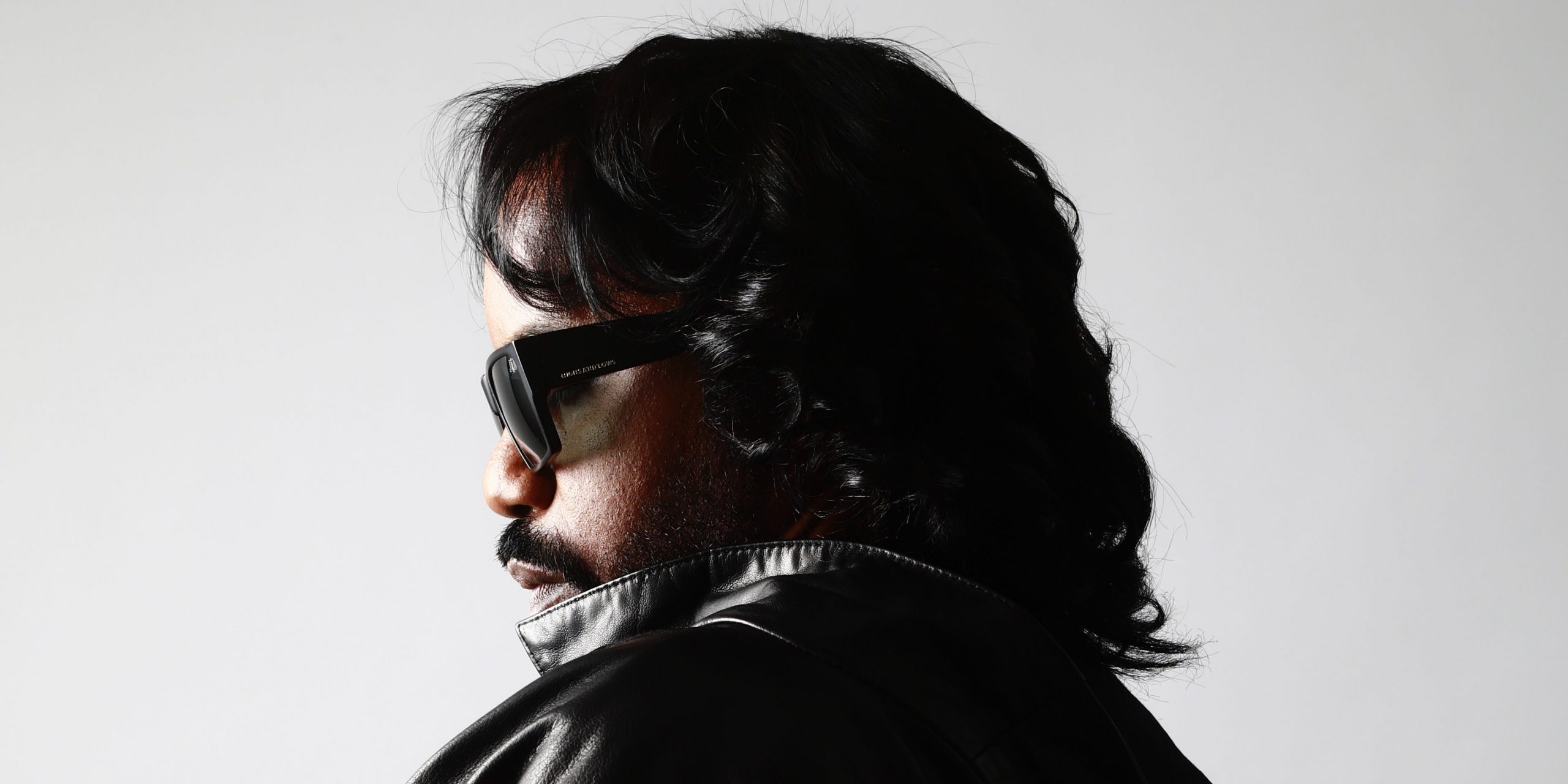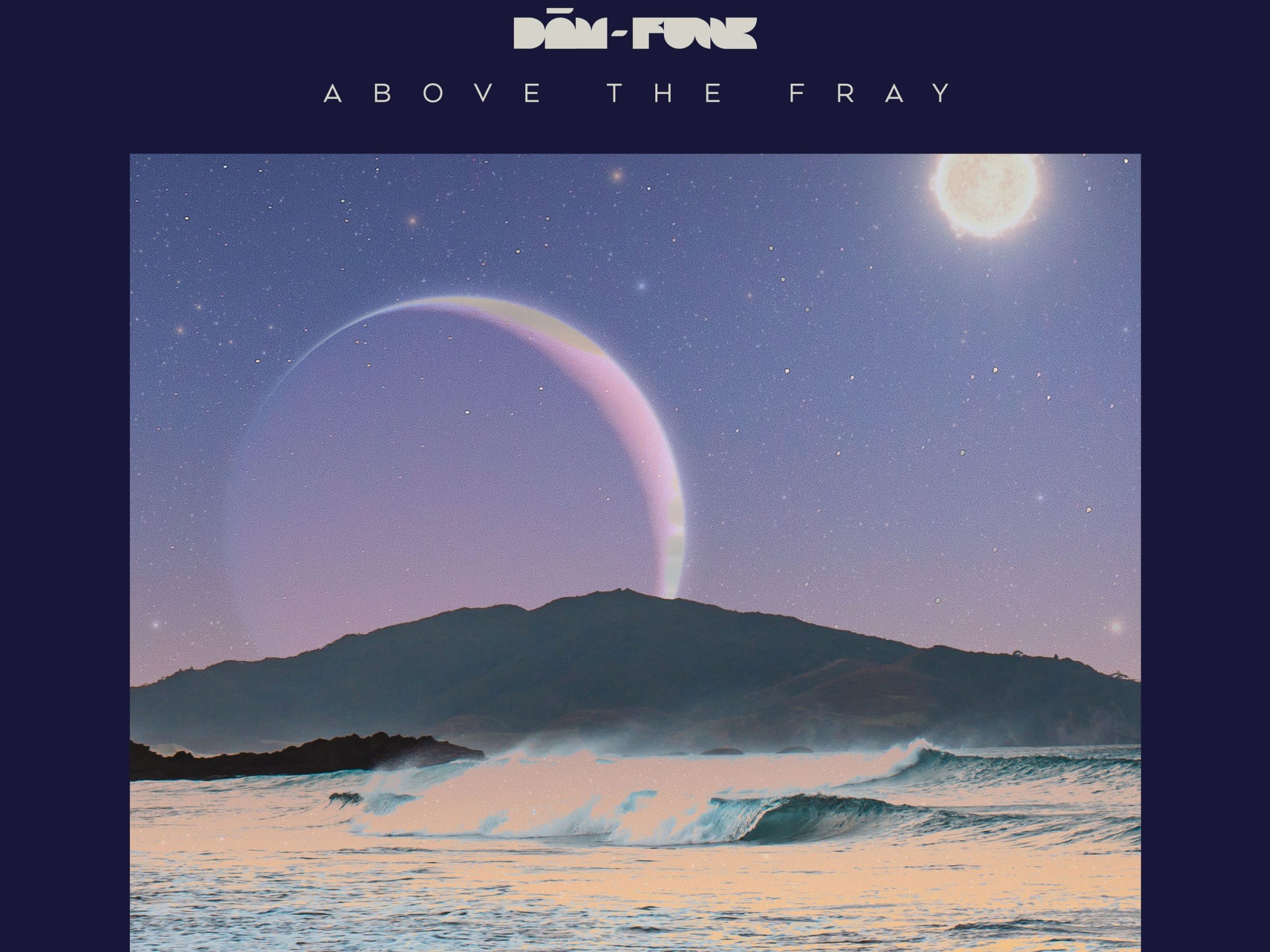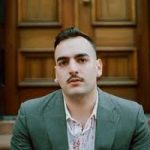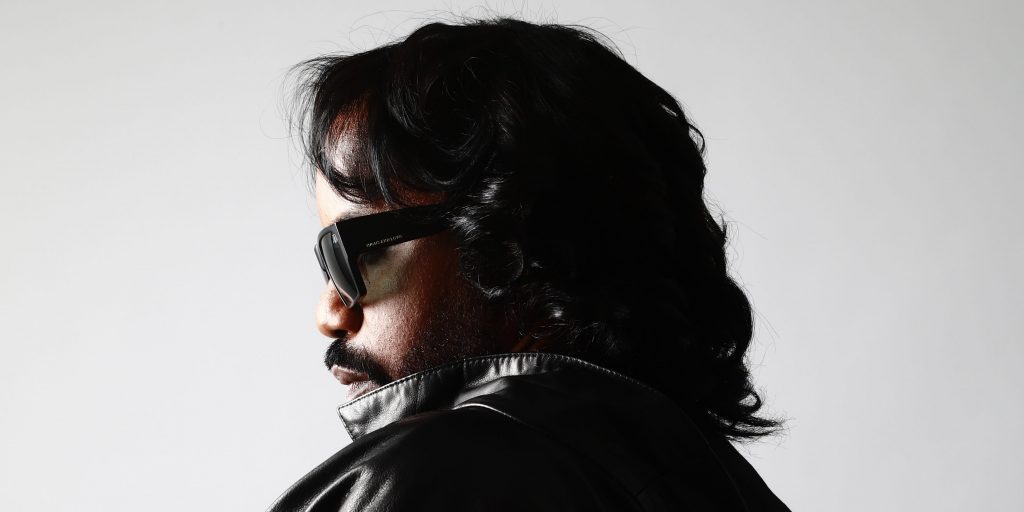
- Modern funk creator DāM-FunK found stillness and inspiration amid the COVID-19 pandemic.
- Slowing down inspired new projects, creative renewal, and a reconnection with his Pasadena roots.
- Insider spoke to DāM-FunK about his new album "Above the Fray."
- Visit Insider's homepage for more stories.
In many ways, DāM-FunK (pronounced Dame Funk) has always been above the fray.
Hailing from Pasadena, California, Damon Garrett Riddick's environment generously influenced his musical mind. He rose as a producer and session musician at the nadir of synth-funk and the rise of G-funk, absorbing the punchy funk of the late 1980s and early 1990s rap built over funk samples or compositions. He toured the world and started Funkmosphere in 2006, his former weekly DJ set in Los Angeles. Under the Stones Throw record label, he released six projects, and now prolifically releases music through his independent music label and company Glydezone Recordings.
His music is an exercise in the art of honoring the past and interrogating the future, producing a sound that is layered by synth lines that meander and guide, growled basslines, meditative chords, and powered by the trademark knock and syncopation of his programmed drums.
It's the committed authenticity of Southern California funk and G-funk infused with celestial ambiance. His versatility has spurred collaborations with stars like Snoop Dogg, Tyler, the Creator, Q-Tip, and the late Mac Miller; sessions with legends Steve Arrington and Todd Rundgren; and releases under alter ego "Garrett."
Insider spoke with DāM-FunK about his new album "Above the Fray" as well as his creative process and outlook on life and music throughout the pandemic. This interview has been edited for length and clarity.
How have things been for you in general, and creatively through the pandemic?
Well, it's a good day in LA. I was on the road for so long, over 10 years, that when it came time to sit down, I was really looking forward to it. So when it all began around March of 2020, I was like, yes, let's sit down for a little bit and kind of recalibrate. And that's what I did, pretty much. And also, I do understand though that a lot of people were worried and hit with anxiety, as far as where things were going on financially for people. So I definitely understand the situation getting back out there.
But I used the sit down for getting my head clear. Re-evaluating some things, maturing on a few different levels, and I even stopped drinking, which I just thought I'd be better for my health. I just personally took the leap, as I did with quitting smoking in 2019, March 25th of 2019, but I just adapted to different, positive things in my life. And so that's what I can tell you that the pandemic helped me on, and rather the sit-down portion of it, it helped me to see more clearly and make some more decisions that I probably wouldn't be able to do when I was being out there in the world so much and so busy all the time.
Can you talk to me about this process of rediscovery on the musical and creative side? Did it feel like being a teenager in Pasadena again, in the early aughts of your music career?
Yeah, no, you hit it on the nail. For some reason, sometimes when I would be on the road or on the airplane or in a hotel or something like that, or just doing things in my life, I started to have flashbacks of making music in Pasadena, California, in my bedroom, with cassette tapes, and bouncing the tracks back and forth to two tape decks and then CDs. And that's how I recorded my first album, was like bouncing CD to CD and stuff like that. It was more like these light flashes in my head, like wow, I think I want to go back home, in a creative, figurative sense, because it felt like I was returning home, especially the new place that I moved into out of LA. And the direction that I have my studio facing is the same direction that I grew up in, as far as like looking west out of the window and looking west and seeing the hills. With the rediscovery part, I was just able to rediscover more confidence in my sound.
I do embrace the future as well, and I embrace new sounds as well. Like, I never want to be the old man on the front lawn screaming at the kids, you know? That's never what I've been like because I would consider myself timeless.
You know, Prince, when he had his era in like the early Eighties, like late-Seventies to mid-Eighties, I would have loved for him to make a few more Ballad of Dorothy Parkers, but he didn't. And I always wish, like why do cats always move on so fast? I mean, you don't have to go make a rock and roll record just because you made a funk record the last album, you know what I'm saying? It's like, just keep rolling the way you feel.
Where did you draw inspiration for the album's title "Above the Fray"?
"Above the Fray" represents being above the noise, like in your own space. It's that drive that you take by yourself, across whatever freeway. You know, you have that time to yourself, and you kind of are able to figure things out, or that walk or that subway ride or whatever, that bike ride on your own. That's what "Above the Fray" is, the time period that you have to not participate in all of the drama that's out there right now. I want to influence people to get it together as we all try to move into this brand new decade together. But right now, we're just going to leave it instrumental so people can just ride and glide, and we're just going to be above the fray. "Above the Fray" is also referring to how everybody's always arguing all the time and getting themselves in trouble online, and being removed from that.
I just wanted to make a record that was instrumental right now, but a full record, and not just like an EP that I've been doing lately, since 2015, which my last full album was "Invite The Light."
"Above the Fray" is the soundtrack to trying to be the best that you can after living some life. We all are human. But, when you start realizing that, okay, I can maneuver in this obstacle course or dodge those crocodiles while I swing across the pond without getting snapped. That's kind of like what life is about. You still try to figure things out and then hopefully you can remain, where? "Above the Fray."

Dam-Funk
In having this kind of stillness, did you find yourself kind of getting into new creative routines, or letting go of old creative routines?
You didn't know what was going to be happening. Are we going to be wrapped in our homes forever? Is this the new norm? So I think from all of that, and it's related to the process of recording this new music and things like that, or just putting this project together, I was able to experiment with connecting with the people through the portal of your social media lives and just sharing things, but then also fine-tuning what you're letting people into. So after a while, I was like, I don't know if I really have to feel comfortable about beaming my place of solace out to people.
I was just getting more in touch with my private life. And I think I enjoy my private life more. And then I realized in order, and through the process of this record to maintain a private life is just to not put out stuff too much out there for the public and just speak through the music. And so that's some of the things that I was able to do as far as this particular project, again, to harness being in a private space.
You were putting out a lot of music throughout this time. Was that kind of part of this renewal that you were going through too, in order to get to "Above the Fray"?
Yes, it was. And also it was a plan to put out more music on a more periodic basis. There have been a lot of little things I was experimenting with between 2015 and 2021. And I really feel good about the Glydezone recordings platform where I could put out stuff where I want to, where it doesn't have to go through red tape, or any things, anybody approving anything.
That's where I'm looking at right now because I definitely want to dive deeper into funk, as far as like chords and different moods, because a lot of people associate funk with a party all the time. And to me, funk isn't always a party. I'm building what I would like to visualize as like a progressive, modern funk corner of the game. That's what I'm trying to convey to people, even though funk is a party and it can be, we love that. I'm proud to say what a genre is. That's probably the difference with me, man, is because I'm not afraid to say I do funk music.
I wasn't a hip-hop kid, I was a funk kid. A Funk kid who liked hip hop, liked new wave, liked heavy metal, liked drum and bass, liked house, all of that stuff. In funk's tradition is always mixing a lot of styles, as you can see with P-funk, with lead guitar solos, by Eddie Hazel. So it was always about experimentation and where a funkster can go to a Frank Zappa concert and not feel weird, you know what I'm saying? So that's where I'm at in just trying to take it further. That's why I would do things like go on tour with cats like Todd Rundgren, for three months. It might not be understood by some cats, but that's what funk is to me too, to be into different styles, but I'm not afraid to call it funk.
You've described funk music as "a smile with a tear" - tell me about that mantra.
The music that I make comes out like that and that applies to other types of funk too. A lot of people know about the song "Juicy Fruit" by Mtume. But it's a cute title and a cute lyric format, but the music is very melancholy. If you listen to that song and the lyrics off of it, you'll hear a different style of funk and not be a party vibe all the time, which we love, don't get me wrong. "Atomic Dog" is a classic, gets everybody up off the seat. But there's room for "Juicy Fruit" or "Primetime" from Mtume, you know what I'm saying? Or there's room for "Hanging on a String" from Loose Ends. And there's room for a lot of different styles of funks. So that's just where I'm at. And I think "Above the Fray" has a lot of moody type of funk in there.
It's all mixed and I'm just trying to take it further because to me, as I've said before, the funk continues, I'm still living funk, my shades are through a funk prism. So I don't want to keep going backwards. I want to do stuff how it sounds in 2022.
You've always brought multi-generational audiences into the fold, whether it's modern progressive funk, or older styles of funk, or Black classical, and electronic music as well. So what do you think it is about the styles of music that you grew up with, and your creation and curation of them, that has this draw to wide audiences?
I think it's just the respect. I think that's the key word. Everybody wants to be respected. Cats like Sly Stone or Isaac Hayes at Curtis Mayfield, or Barry White, or Ohio Players, and those cats, they came before me. So, I try to keep them in the mix when I do things or, drops of P funk at a show and "Knee Deep" by Funkadelic, the whole 15-minute version. And then followed up with the latest track by Specter, or something by Omar S, or Moodymann.
I mean, you play "A Family Affair" by Sly and Family Stone, and you can put that right next to something that came out a couple of years ago. I try to respect the people who came before me, because I grew up with a mom and dad in the house, and my dad was always open-minded. Like on the weekends, when he wasn't working, he'll build a whole wall in the backyard by itself, cut the grass, the lawnmower. Have a briefcase during the week and this fresh suit and the cleaners, and drove into Burbank and went to work every day. That's the kind of stuff I grew up on.
There's room for people like myself that came from my experience, living in the corner of Sunset and Hammond in Pasadena that you can share music from this prism. A lot of art that's celebrated is always coming from a dark place, especially with Black music. Black trauma is very profitable. So it's like when you're not talking about Black trauma all the time, it's kind of like you get lost in the sauce it seems. But I'm not here to complain. I'm just saying that I'm glad that I'm at least interjecting and showing that you don't have to really do Black trauma all the time in the music and art. I feel that I'm an alternative for people of all shades, and all backgrounds, and worldwide.
And I think that's probably what has taken me throughout the world, like Dubai, and Russia, China, Eastern Europe. And I think when you do things from the heart, the universal law of energy picks up on that and you get that universal love, and it's not so regionally based. And that's why I'm able to maybe go out to so far different places, but then walk around in my own backyard and people might not know who I am.
What it is, is that I just want to make music that, like how I felt growing up. I will look out the window and put the record in a record player, and I'd just stare at the mountains and the window and rocking my chair to it. I want to provide that type of experience for people.
And how about your new weekly show with Apple Music hits, Glydezone Radio. How you're feeling about having that new platform?
They tapped me to do it, and I just was surprised because there were a lot of different radio opportunities that would come here and there from different, very reputable platforms that we all enjoy online. But this particular one really caught my attention because it was the freedom that I enjoy to be able to do whatever I want, creative freedom. And then also being that I was able to be taken care of from a level where you're respected and not expected to do anything. And I would've never expected companies like Apple to have you a part of something that you're not compromising yourself. And that's what I'm really appreciative of. And I'm just able to share music with people and on a weekly basis.
I just like to try to mix it up in this Glydezone Radio show, to show people that I don't only enjoy boogie and disco and funk. I'm a funkster, but I enjoy all styles of music, young and old. And that's just what I'm trying to do. There's nothing wrong with being a funkster and enjoying other people's styles of music. I just love any kind of music that's out there that makes me feel interested in something different.
And I came from the generation that was kind of like the bridge, if you will, I call it the bridge generation, from regular Saturday morning cartoon TV and a TV in the living room that everybody had fun in front of, with only one day of cartoons on Saturday, maybe a few on Sundays, and then the weekdays was after school. I'm just happy to remember those times, and then now I'm not, like I said, will never be that guy on the front lines screaming at the next generation. I'm embracing what's going on, but also maintaining my own stance within it all through the radio show.
How do you feel about the last decade or so being this more mainstream embrace of Disco and Funk sensibilities?
I feel pretty cool about it. It's like, people will try to pit me against different people sometimes on social media, things like that. But I never fell for it, and I just feel, I've always dreamed of funk being back in the game to a level where people respect it and not just joking about it all the time, making it kind of a tongue-in-cheek thing. So you can hear it definitely in a lot of the music. You're right, you can definitely hear the influence. They're not necessarily calling it funk, but you can definitely hear the influence. It's like a mesh between disco and funk. You're right, with the four on the floor thing, you can hear the guitar, kick and scratch guitar, and some of the bass lines, and things like that. Then putting a different front cover on it.
So I definitely see it. I'm not bothered by it. It's like, everybody has their time and every music has their moment. I wonder what people were thinking when metal was popular and the hair bands. Did the rock groups like Rolling Stones and all of those guys trip off of it? I don't know. But probably not. They probably had some jokes here and there. There's some good production out there, man. I've been listening.
There will always be a McDonald's and there will always be the local burger stand. You got a choice.
But I just wanted to ask you, how, coming out of, in the period of the pandemic that we're in, how are you feeling about live performances? What do you have lined up? What are you excited about?
I'm just excited to share some different things, like new music, and then also share things, like curating mixtures of, maybe like a solo live set where I still play other people's stuff I would like people to hear, and also some of my original stuff. But also I'm gradually bringing back some live elements with one of the members of my earlier configuration. His name is Keith "E-Day" Eaddy, and he plays bass and keys. And I'm thinking about adding more elements but right now just sticking with E-day to join me on some of the shows. So he knows my music and we have a rapport. We laugh with each other and that kind of thing. So he gets it.
I'll be definitely bringing my own microphone to shows and that kind of thing, and if I don't have one, sanitizing, that kind of thing. We're just in a new era right now. We have to really protect ourselves, protect people around us. And just be mindful, whatever you believe, be mindful of other people's space.
I think 2022 is more of a realistic period that I think people will be more ready to really go out like that again. Some of the shows, they're coming up at the end of the summer, we'll see how things go, I'm still going to be dotting my I's and crossing my T's out here as we progress out here and return. But I'm looking forward to trying to be a part of the comeback.

